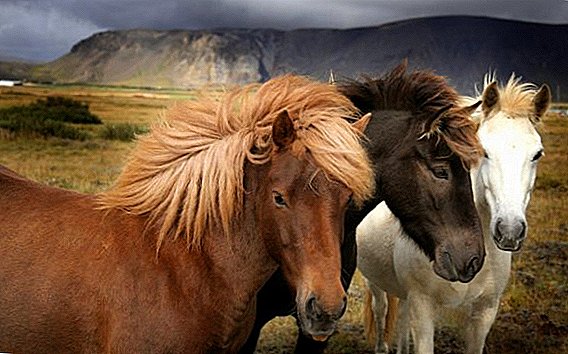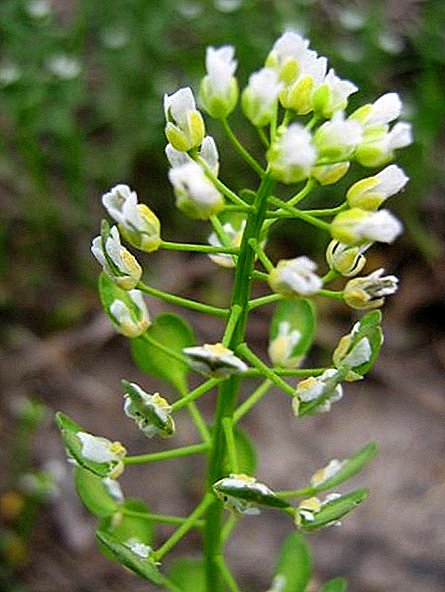 The name of the field yarutka (grass growing throughout the northern hemisphere of the Earth) says nothing to the mind or heart of most people. Meanwhile, the people gave her about a dozen other names that are practically unrelated to each other: “kopeechnik”, “klopik”, “skimmer”, “love grass”, “vertebra”, “toad grass”, “verednik”, "whisk". This fact in itself testifies to the interest in it, since indifference will never cause such a flood of fantasy in the choice of names. Indeed, field yarutka is a truly wonderful plant, and you will now find out why.
The name of the field yarutka (grass growing throughout the northern hemisphere of the Earth) says nothing to the mind or heart of most people. Meanwhile, the people gave her about a dozen other names that are practically unrelated to each other: “kopeechnik”, “klopik”, “skimmer”, “love grass”, “vertebra”, “toad grass”, “verednik”, "whisk". This fact in itself testifies to the interest in it, since indifference will never cause such a flood of fantasy in the choice of names. Indeed, field yarutka is a truly wonderful plant, and you will now find out why.
Botanical description
This annual grass has as many as 60 species. Its growth can reach 70 centimeters, it blooms all summer, managing to give more than one generation of seeds. It is considered a valuable medicinal raw material, which is practically all of its “body”: from leaves to fruits, with the exception of the root system.
Flowers have a strong mustard smell. Stems can be both ordinary and branched. In the lower part they are supplemented with petiolate leaf plates, oval, or elongated, and sessile, arrow-shaped leaves are located at the top.
Did you know? One bush of love grass in just one season can produce about 50,000 seeds that do not lose germination for ten years.
 The fruits of the plant are represented by rounded pods, with brown furrowed seeds (1.75-2.5 mm in length).
The fruits of the plant are represented by rounded pods, with brown furrowed seeds (1.75-2.5 mm in length).
Chemical composition
Actually, science did not pay much attention to this weed, which is why its composition was determined not so thoroughly as in more noble plants. And yet, something about the fact of what components consists of a twist, people know.
Love grass is simply oversaturated with ascorbic acid and protein, and also contains fiber and fats. Flavonoids, saponins, alkaloids are revealed in it.
Its seeds are exactly one-third composed of oils, which contain numerous fatty acids, including linolenic, oleic and linoleic, and the mustard oil contained in the plant gives its flowers a characteristic mustard smell.  But another interesting component of the plant in the form of glycoside sinigrin, provides grass seeds non-weak garlic odor. For this reason, cows that have been fed grass with seeds of field yarn produce milk that is clearly rendered with a garlic flavor.
But another interesting component of the plant in the form of glycoside sinigrin, provides grass seeds non-weak garlic odor. For this reason, cows that have been fed grass with seeds of field yarn produce milk that is clearly rendered with a garlic flavor.
Distribution and habitat
This unpretentious grass feels great everywhere, throughout the northern hemisphere, and some of its sixty species are found even in South America.
In fact, it is a weed, growing everywhere along the roadsides, in the meadows and illegally penetrating the gardens. But the very name of the yarutka field gives out its most favorite habitat - the field.
Did you know? In ancient times, everyone willing to get rich, always had a fresh or dried stalk of this grass. For this reason, the yarn field was also called "kopeck" or "moneybook".
Medicinal properties
The beneficial properties of this plant even more than the names themselves, which is not surprising. Drugs from field yarutki have the ability to stop blood, disinfect and heal wounds, fight inflammatory processes, microbes and scurvy.  They have proven themselves as an astringent, diuretic and expectorant. They have noticed the ability to tone up the body and strengthen its immune system.
They have proven themselves as an astringent, diuretic and expectorant. They have noticed the ability to tone up the body and strengthen its immune system.
Expectorant properties that will help to cope with cough also have: a white clover, ground reed, savory, ivy-shaped bud, silver goof, blue cyanosis, birch, oregano, bitter wormwood, chervil, plecranthus, bruise, heather, and virgin.
And the most famous of the healing properties of meers is its ability to activate perspiration, during which the body is radically cleansed of toxins and slags.
Medical applications
While the official medicine bypasses the healing qualities of the mete, folk healers use it extensively and successfully. With the help of infusion from seed, healers effectively combat cardiovascular problems in the form of myocarditis, atherosclerosis and hypertension, diabetes, constipation and eye inflammation.  Herbal decoction has proven itself well in combating stomach acidity or, if necessary, to stop diarrhea, as well as to relieve a headache.
Herbal decoction has proven itself well in combating stomach acidity or, if necessary, to stop diarrhea, as well as to relieve a headache.
As a remedy for diarrhea also use hazel, orchid, zizifus, skumpiyu, astragalus and sour.
As an expectorant, an infusion of herbs can alleviate the course of colds, as well as it is used in the treatment of angina, bronchitis, jaundice, scarlet fever, cough, and edema.
Crushed green plants or decoction of it well heal cuts and ulcers on the skin. Fresh juice extracted from yarutki leaves copes well with the same. He also successfully fights warts.
And the powder from the leaves or a decoction of them helps to resist the inflammation of the female ovaries, contributes to the smooth flow of menstruation and even helps the official medicine in the fight against uterine cancer.
Benefits for men
The grass of love attracts the special attention of folk healers with its ability to deal with male sexual problems.  It is one of the few remedies that are really capable of treating impotence at different stages of its development, healing the prostate gland, healing inflammatory processes in it and successfully normalizing the sexual functions of the male body.
It is one of the few remedies that are really capable of treating impotence at different stages of its development, healing the prostate gland, healing inflammatory processes in it and successfully normalizing the sexual functions of the male body.
And yet, recently, love grass is becoming popular as a replacement for expensive Viagra, successfully acting as a stimulant of potency. As the practice of traditional healers shows, the actual results of using drugs from field medicine manifest themselves after ten days of its regular use.
Contraindications
Like any other remedy, drugs from the field remedy cannot be taken by people with individual intolerance to any of its components.
With the ability of drugs from this plant to reduce blood pressure, they, of course, are forbidden to use for patients suffering from hypotension. You can not take any medication from the merit to children under two years of age. 
Important! Drugs from this herb are strongly contraindicated in pregnant women, since the abortive properties of these drugs provoke miscarriage.
Grass cultivation
Although the field yarut is a typical weed, many of its indisputable medicinal qualities encourage folk healers to cultivate this plant in their garden or in the garden, so that it will always be close to and grow under the supervision of optimal conditions for themselves.
Landing features
Love grass reproduces mainly seeds. They can be planted from April until summer, in well-moistened soil at temperatures from +13 to +18 ° C. This unpretentious plant does not need special care.
In spring, you can propagate the grass by dividing the bush (before or after flowering), digging it out and dividing the root system into several parts, and then planting them 20-25 centimeters from each other in the wet soil.  In the middle of summer, plant propagation is practiced, in which cut stalks up to ten centimeters long are dropped into the soil and protected from the sun before rooting.
In the middle of summer, plant propagation is practiced, in which cut stalks up to ten centimeters long are dropped into the soil and protected from the sun before rooting.
Lighting and temperature
The name of a yarutka field plant implies her love for the expanses of fields and the bright sun above them. It is clear that in the garden plot for her should choose the most lighted place. At the same time, the plant is not demanding for special temperature conditions and always feels great in good sunlight.
Substrate and fertilizer
This unpretentious grass grows well on drained loamy soils. Also, mulching with compost or humus will not hurt. Sometimes gardeners use gravel for additional drainage.
Watering and moisture
A field field is much easier to tolerate a lack of moisture than its excess. Especially dangerous for her is the stagnation of moisture in the soil, in which it grows slowly and withers. In dry weather, during the active growing season, the plant should still be watered occasionally. 
How to properly collect and store: procurement of raw materials
When preparing raw materials for the preparation of medicinal preparations, all parts of the grass that are above the ground are used. The flowering period is the best time for harvesting green stems and leaves, and for seeds the optimal harvest time is the end of summer.
Harvested grass is laid out in a small layer in the shelter, which reliably protects it from rain and sun, and when it dries, it moves into cardboard or cotton containers and is stored in a dry place for no more than a year. Sometimes dried raw materials are ground into powder.
Infusion for men
A popular remedy that actually enhances potency and helps in overcoming infertility is made like this.
Rosehip, scorzonera, periwinkle, maral root, hazelnut, parsley, Crimean zheleznitsa, melon, dope ordinary, horseradish, asparagus, arrows of garlic, goryanka, ginger, thyme, saffron and nutmeg also have a beneficial effect on potency.
 One and a half tablespoons of dry grass is crushed with a blender to the consistency of powder and poured into 200 milliliters of boiling water.
One and a half tablespoons of dry grass is crushed with a blender to the consistency of powder and poured into 200 milliliters of boiling water.
Having given the solution in a thermos for at least four hours, the product should be taken in a tablespoon every four hours. Another anti-impotence remedy is made using alcohol. In it, in a ratio of one to ten, is added powder from love grass.
Important! During the day, the number of such medications should not exceed six times.
The resulting solution, in a securely closed glass container, must be put in a dark place for up to six months. This medicine, one teaspoon daily, thirty minutes before breakfast, will have to be taken within four months.
This herb, which has a dozen of different names, has no less healing properties.  Yarutka field, being a malicious weed on wheat and rye fields, managed to break into the rows of cultivated plants and is now grown as a raw material for the production of effective therapeutic agents.
Yarutka field, being a malicious weed on wheat and rye fields, managed to break into the rows of cultivated plants and is now grown as a raw material for the production of effective therapeutic agents.












